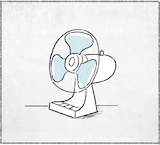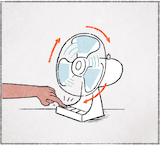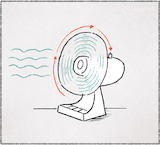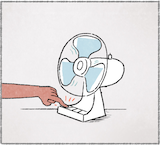



นี้คืออี่หยัง นี้คือพัดลม เป็นพัดลมตั้งโต่ะ หลือเป็นพัดลมตั้งพื้น บ่แม่นพัดลมฝาผะหนัง
พัดลมอันนี้เอาไว้เฮ็ดหญัง เอาไว้ถ้าเฮ็ดให้ความเย็น ไว้ถ้าเพิ้มความเย็นนั้นหละ
ญามเวลาฮ้อน หลืออากาดฮ้อน เฮาสามาดเปิดพัดลมนี้ได้ แล้วสิเฮ็ดให้อากาดเย็น หลือเฮ็ดให้เฮาเย็นนั้นหละ
พัดลมอันนี้ใซ้งานจั่งใด พัดลมอันนี้สิมีสายไฟ เสียบปั่กไฟฟ้า แล้วกะสิมีปุ่มเปิดกับปุ่มปิด
ขั้นเฮาสิใซ้งานพัดลมอันนี้ เฮากะเสียบปั่กไฟฟ้า แล้วเฮากะเปิดปุ่มเปิด แล้วมันกะสิติด แล้วพัดลมกะสิสามาดใซ้งานได้
พัดลมอันนี้ใซ้ไฟฟ้าบ่ ใซ้อยู่ พัดลมอันนี้ใซ้ไฟฟ้าพ้อม ขั้นบ่มีไฟฟ้า มันกะเปิดบ่ติด ขั้นมีไฟฟ้า มันกะสามาดใซ้งานได้
6
เขากำลังเฮ็ดหญัง เขากำลังเปิดพัดลม
เป็นหญังเขาคือเปิดพัดลม บ่ลู้คือกัน เขาอาดสิฮ้อน หลืออากาดมันฮ้อน เขากะเลยเปิดพัดลม เพื่อเพิ้มความเย็นกะได้
คือฮู้ว่าเขาเปิดพัดลม กะฮู้เพาะว่า เขากำลังเปิดปุ่มเปิดพัดลม แล้วพัดลมมันกำลังหมุนอยู่ พัดลมมันกำลังใซ้งานอยู่ กะเลยฮู้ว่าเขากำลังเปิดพัดลม
เป็นหญังเขาคือกดปุ่ม กะต้องกดปุ่ม เพาะว่า ขั้นบ่กดปุ่ม มันกะบ่ติด เพาะว่า ต้องกดปุ่มเปิดกับปุ่มปิด ขั้นสิเปิดพัดลม กะต้องเปิดปุ่มเปิด ขั้นสิปิดพัดลม กะต้องปิดปุ่มปิด
7
พัดลมมันกำลังเป็นหญัง พัดลมมันเป็นอี่หยังอยู่ตอนนี้ พัดลมมันกำลังเปิดอยู่ พัดลมมันกำลังใซ้งานอยู่ เพาะว่ามีคนไปเปิดพัดลม หลือใซ้งานพัดลม แล้วเฮ็ดให้พัดลมหมุน หลือพัดลมใซ้งานอยู่
ตอนนี้มันเย็นบ่ กะเย็นอยู่ เพาะว่าเปิดพัดลมแล้ว พัดลมกะสิเพิ้มความเย็นให้เฮา สิเฮ็ดให้อากาดเย็น สิเฮ็ดให้มันเย็นขึ้น
ขั้นมันเย็นแล้วมันสิคายความฮ้อนบ่ กะคายความฮ้อนอยู่ ขั้นเปิดพัดลมแล้ว มันกะสิเฮ็ดให้เย็น บ่เฮ็ดให้ฮ้อน สิเฮ็ดให้อากาดเย็นขึ้น
พัดลมโตนี้มันมีเสียงบ่ พัดลมโตนี้มันเสียงดังบ่ กะเสียงดังอยู่ แต่บ่เสียงดังหลาย กะแล้วแต่โต แล้วแต่ลุ้น
ขั้นลุ้นใดเสียงแฮง มันกะเสียงแฮง ขั้นลุ้นใดเสียงเบา มันกะเสียงเบา แล้วแต่ลุ้น แล้วแต่ยี้ฮ้อพัดลม
พัดลมโตนี้มันหมุนเล็วบ่ กะหมุนเล็วอยู่ เพาะว่าขั้นหมุนเล็ว มันกะเย็น มันกะเย็นคัก เย็นคักอี่หลี ขั้นมันหมุนซ้า มันกะสิบ่เย็น มันกะสิเย็นหน่อยเดียว บ่เย็นคัก
8
เขากำลังเฮ็ดหญัง เขากำลังปิดพัดลม
เป็นหญังเขาคือปิดพัดลม อันนี้กะบ่ลู้คือกัน เขาอาดสิบ่ใซ้งานพัดลมแล้วกะได้ เขากะเลยปิดพัดลม
คือฮู้ว่าเขาปิดพัดลม กะฮู้เพาะว่าเขากำลังกดปุ่มปิดพัดลม แล้วพัดลมมันกำลังหยุด พัดลมมันบ่ได้ใซ้งาน กะเลยฮู้ว่า เขากำลังปิดพัดลม เขากำลังบ่ใซ้งานพัดลมอยู่
Link to overview page
Link to dictionary
| Isaan | Pronunciation | Tones | Thai | English/Notes |
|---|---|---|---|---|
| นี้ | ni: | HF | นี้ | 1. this 2. here |
| คือ | khʉ: | HR | คือ | 1. to be, to resemble, like, as 2. why {บักหล้าคือบ่เก็บโต่ะแน่ = [addressing a young boy] Why haven't you cleared the table?} |
| อี่หยัง | i:-yaŋ | H-M | อะไร | 1. what {นี้คืออี่หยัง = What is this?} {มื้อนี้เจ้าเฮ็ดอี่หยัง = What are you doing today?} {กินเข้างายกับอี่หยัง = What did you have for breakfast?} 2. something, anything, (in negations) nothing {บ่ต้องเฮ็ดอี่หยังอีกเลยนอกจากใส่ปุย = [we] don't need to do anything besides adding fertilizer} |
| พัดลม | phat-lom | H-HR | พัดลม | fan |
| เป็น | pen | M | เป็น | 1. to be, to exist 2. to be able to 3. to suffer, sth. happens to 4. เป็นหญัง[...]คือ in initial position: why? {เป็นหญังเขากะคือแปงฟัน = Why is he brushing his teeth?} {เป็นหญังเคี่ยงบินมันคือสิตก = Why is the airplane falling down?} |
| ตั้ง | taŋ | HF | ตั้ง | to set/put up, to install, to establish, to erect {เขาตั้งนาลิกาปุกตอนสองโมงเซ้า = he sets the alarm clock to eight o'clock in the morning} {พัดลมตั้งโต่ะ = table fan} {ทะนาคานมันสิไปตั้งไว้อยู่ซู่หม้องเอาโลด = banks are [established/can be found] everywhere!} {ตั้งไฟ = to set up a fire} |
| โต่ะ | to | H | โต๊ะ, เก้าอี้ | 1. table 2. chair |
| หลือ | lʉ: | M | หรือ | or |
| พื้น | phʉ:n | HF | พื้น | 1. floor, ground 2. surface, area {หล่นลงไปลงพื้น = [it] falls to the ground} {เขานั่งอยู่เทิงพื้น = he's sitting on the floor} |
| บ่แม่น | bɔ:-mɛ:n | H-H | ไม่ใช่ | 1. not {เขาเป็นพุหญิง เขาบ่แม่นพุซาย = she's a woman, she's not a man} 2. no |
| ฝาผะหนัง | fa:-pha:-naŋ | M-M-M | ฝาผนัง | wall |
| อัน | an | M | อัน | 1. thing, object 2. general clf. for objects |
| เอา | ao | M | เอา | to take, to give {เขากำลังเอาก่องไปซั่ง = he's taking the boxes to weigh them} {หมอกำลังเอายาให้คนป่วยกิน = the doctor is giving medicine to the patient} {เอาไว้ถ้า = is for, is used for, has the purpose of} |
| ไว้ | wai | HF | ไว้ | 1. to keep, to put, to place, to retain, to save, to reserve {เขาเอาหัวของเขาไว้ใส = Where does she put her head?} {หมาสิเลี้ยงไว้บ้าน = dogs are kept/raised in the house} {ไก่เลี้ยงไว้ในคอก = chicken are kept/raised in a coop} {หน้ามันบังไว้ = the face is covered/not visible} {เขาเอาโทละสับวางไว้หู = he holds the phone to his ear} 2. for {นาลิกาปุกมีไว้เฮ็ดหญัง = What is an alarm clock for?} {หม้อเอาไว้เฮ็ดแนวกิน = a pot is used to make food} {ก่องเอาไว้เฮ็ดหญัง ก่องเอาไว้ใส่ของ = What is the box for? It's for putting in stuff.} Notes: see also ไว้ถ้า |
| เฮ็ด | het | H | ทำ | to do, to make |
| หญัง | ɲaŋ | M | อะไร, เป็นหญัง = ทำไม | 1. what {เขากำลังเฮ็ดหญัง = What is he doing?} {ธูปเอาไว้เฮ็ดหญัง = What are incense sticks for?} 2. something, anything, (nothing) 3. เป็นหญัง[...]คือ in initial position: why {เป็นหญังเขาคือใส่บักพิกลงไปในกวยเตียว = Why is he putting chili in [his] noodle soup?} {เป็นหญังหน้าต่างมันคือเปิด = Why is the window open?} {เป็นหญังมันคือมีควนไฟ = Why is there smoke?} |
| ไว้ถ้า | wai-tha: | HF-LF | usually in a positive statement or answer: is for, is used for, has the purpose of {กะทะมีไว้ถ้าทอด = a pan is for frying} {น้ำบักนาวมีไว้ถ้าปุงอาหาน = lime juice is used to season food} {ปากกามีไว้ถ้าเขียน = a pen is for writing} {กะเทียมเอาไว้ถ้าเฮ็ดแนวกิน = garlic is used to make food} {ขาเอาไว้ถ้าญ่าง = legs are for walking} {เกิบเอาไว้ถ้าใส่ = shoes are for wearing} Notes: see also ไว้ |
|
| ให้ | hai | LF | ให้ | 1. to give {หมอกำลังเอายาให้คนป่วยกิน = the doctor is giving the patient medicine} 2. for 3. to allow, to be allowed |
| ความเย็น | khwa:m-yen | HR-M | ความเย็น | coldness, coolness |
| เพิ้ม | phə:m | HF | เพิ่ม | 1. to add, to increase 2. plus |
| นั้นหละ | nan-la | HF-M | นั่นแหละ | auxiliary for emphasis at the end of a phrase |
| ญาม | ɲa:m | HR | ยาม | 1. period of time {ญามมื้อเซ้า = morning} {ญามเที่ยง = noon} 2. when, while {ญามทอด ต้องใซ้น้ำมันพ้อม = one needs to use oil when frying} {ญามสิออกไปข้างนอกกะต้องใส่เกิบ = when one goes out, ones has to wear shoes} |
| เวลา | we:-la: | HR-HR | เวลา | time, period |
| ฮ้อน | hɔ:n | HF | ร้อน | hot |
| อากาด | a:-ga:t | M-LF | อากาศ | 1. weather, climate 2. air |
| เฮา | hao | HR | เรา | 1. personal pronoun: we 2. personal pronoun: I |
| สามาด | sa:-ma:t | M-HF | สามารถ | can, to be able |
| เปิด | pə:t | M | เปิด | 1. to open {เปิดหน้าต่าง = to open the window} {เปิดปะตู = to open the door} 2. to start, to switch on {เปิดไฟ = to switch on the light} {เปิดแอ = to switch on the A/C} |
| ได้ | dai | HF | ได้ | 1. can 2. to get, to obtain 3. before verb: indicating past tense 4. บ่ได้ + verb: not |
| แล้ว | lɛ:o | HF | แล้ว | 1. finished 2. already 3. and then, and next (especially แล้วกะ) 4. auxiliary for past tense |
| สิ | si | M | จะ | future tense auxiliary {เขากำลังสิตื่น = he's about to wake up} {สิไปตะหลาด = [I'm] going to the market} |
| เย็น | yen | M | เย็น | cold, cool (air, objects) |
| ใซ้งาน | sai-ŋa:n | HF-HR | ใช้งาน | to use, to put to use |
| จั่งใด | jaŋ-dai | H-M | ยังไง, แบบไหน | how, in what manner {บักนาวมันมีลดซาดจั่งใด = Lime fruits have what kind of taste?} {เขาปิดแอจั่งใด = How is he switching off the A/C?} {เทียนใซ้จั่งใด = How's a candle used?} {สิใซ้จั่งใด = how is [it] used?} |
| มี | mi: | HR | มี | 1. to have 2. there is |
| สายไฟ | sa:i-fai | M-HR | สายไฟ | power cord, cable |
| เสียบ | si:ap | LF | เสียบ | to insert, to put in {เสียบปั่ก = to plug in} {ใซ้ซ้อนส้อมเสียบลูกซิ้น = to pick up meat balls with a fork} |
| ปั่ก | pak | H | ปลั๊ก | 1. plug 2. socket |
| ไฟฟ้า | fai-fa: | HR-HF | ไฟฟ้า | electricity |
| กะ | ga | M | ก็ | 1. then, consequently 2. also |
| ปุ่ม | pum | H | ปุ่ม | button |
| กับ | gap | M | กับ | 1. and {ลุงกับป้า = uncle and aunt} {กวยเตียวหมูกับกวยเตียวไก่ = noodle soup with pork and noodle soup with chicken} 2. with, to {ค้ายๆ กับคำว่า ... = similar to the word ...} 3. prefix in front of foods {กับเข้า = side dishes eaten with rice} {เขากินกับกวยเตียว = he's eating noodle soup} |
| ปิด | pit | M | ปิด | 1. to close {ปิดปะตู = to close the door} {ปิดก่อกน้ำ = to close the tap} 2. to finish, to switch off {ปิดไฟ = to switch off the light} {ปิดวิทะยุ = to switch off the radio} |
| ขั้น | khan | LF | เมื่อ | when, if |
| มัน | man | HR | มัน | it (also used to refer to people) |
| ติด | tit | M | ติด | to light, to ignite {ขั้นบ่กดปุ่ม มันกะบ่ติด = [of a device or appliance] if you don't press the button, it won't start} |
| ใซ้ | sai | HF | ใช้ | to use |
| บ่ | bɔ: | H | ไม่ | 1. no, not 2. question particle, transforming a statement into a question Notes: spelling exception in line with common usage on social media |
| อยู่ | yu: | H | อยู่ | 1. to be (located) at 2. yet, still 3. auxiliary indicating continuous or progressive action {ทอดปาอยู่ในกะทะ = (in the process of) frying a fish in the pan} {แม่กำลังเมี้ยนเฮียนอยู่ = mother is cleaning/tidying up the house} |
| พ้อม | phɔ:m | HF | พร้อม | at the same time, also, too {มีตะเว็นพ้อม = the sun's out, too} {กะทะมีด้ามพ้อม = the pan has also a handle} |
| เขา | khao | M | เขา | personal pronoun: he, she |
| กำลัง | gam-laŋ | M-HR | กำลัง | auxiliary indicating continuous or progressive action |
| ลู้ | lu: | HF | รู้ | 1. to know 2. to understand Notes: equivalent to ฮู้ |
| คือกัน | khʉ:-gan | HR-M | เหมือนกัน | 1. also, likewise, similarly {ยินดีที่ได้ฮู้จักคือกันคับ = Nice to meet you too!} 2. in negative sentences: either {บ่ลู้คือกัน = I don't know either} {จักคือกัน = I don't know (either)} |
| อาด | a:t | LF | อาจ | 1. might, may, will 2. likely |
| เลย | lə:i | HR | เลย | 1. futher on, beyond, past {เข็มน้อยเลยเลขสิบสองไป = the minute hand has passed number twelve} 2. too much 3. at all 4. definitively 5. completely, utterly |
| เพื่อ | phʉ:a | H | เพื่อ | for Notes: the vowel เอือ is likely to be a Thai loan; pronunciation: also realized as เพี่ย |
| ฮู้ | hu: | HF | รู้ | 1. to know 2. to understand Notes: equivalent to ลู้ |
| ว่า | wa: | H | ว่า | 1. that, as {คำว่า X = the word X} 2. to say |
| เพาะว่า | phɔ-wa: | H-H | เพราะว่า | because |
| หมุน | mun | M | หมุน | to turn, to rotate {เขากำลังหมุนปิดก่อกน้ำ = he's turning off the tap} {พัดลมหมุน = the fan is running/rotating} |
| กด | got | M | กด | 1. to push, to press (down) {กดปุ่ม = to push a button} 2. to withdraw [money] {กดเงิน = to withdraw money} |
| ต้อง | tɔŋ | HF | ต้อง | to have to, must |
| ตอนนี้ | tɔ:n-ni: | M-HF | ตอนนี้ | now |
| คน | khon | HR | คน | person, people |
| ไป | pai | M | ไป | 1. to go 2. auxiliary indicating action extending into the future |
| ขึ้น | khʉn | LF | ขึ้น | 1. to go up, to increase 2. sun: to rise {ตะเว็นกำลังขึ้น = the sun is rising} 3. more 4. bus/train etc.: to get on, to board {พุโดยสานขึ้นลดไฟเบิดแล้ว = all passengers have boarded the train} |
| คาย | kha:i | HR | คลาย | to relieve, to alleviate, to ease {คายความฮ้อน = to get relief from the heat, to cool down} |
| ความฮ้อน | khwa:m-hɔ:n | HR-HF | ความร้อน | heat Notes: pronunciation: also realized as ความล้อน |
| โต | to: | M | ตัว | 1. body, self 2. clf. for animals, characters/letters/consonants, appliances, clothes (e.g., pairs of trousers, shirts) |
| เสียง | si:aŋ | M | เสียง | 1. sound, noise 2. tone, voice |
| เสียงดัง | si:aŋ-daŋ | M-M | เสียงดัง | loud |
| แต่ | tɛ: | H | แต่ | 1. but {แต่บ่ต่างกันหลาย = but not very different} {แต่บ่ลู้ว่าเขาญ่างมาแต่ใส = but [I] don't know where he's coming from, see also: แต่ว่า} 2. only {ตอนนี้มีแต่ขี้ฝ้า = now there are only clouds} |
| หลาย | la:i | M | เยอะ, มาก | many, much, very |
| แล้วแต่ | lɛ:o-tɛ: | HF-H | แล้วแต่ | up to, depending on |
| ลุ้น | lun | HF | รุ่น | 1. model, version 2. generation, age |
| ใด | dai | M | ใด | 1. which, that one which, what, how {เขานั่งแบบใด เขานั่งขดตะหมาดอยู่ = How is he sitting? He's sitting cross-legged.} {ตอนใด = when?} 2. whichever, whoever {หม้องใดหม้องหนึ่ง = some place, somewhere} {ขั้นเฮาอยากตื่นญามใด เฮากะตั้งเวลาปุกญามนั้น = If we want to get up at a certain time, we set the alarm to that time} Notes: sentence-final often with a marked rising tone |
| แฮง | hɛ:ŋ | HR | แรง | 1. strong {ลมกำลังพัดแฮงอยู่ = to wind is blowing strongly} 2. loud {เสียงแฮง = loud} 3. strength, power |
| เบา | bao | M | เบา | 1. weight: light 2. soft, gentle 3. volume: quiet/not loud {เปิดเพงเบาๆ = to switch on/listen to a song at moderate volume} |
| ยี้ฮ้อ | yi:-hɔ: | HF-HF | ยี่ห้อ | brand, brand name |
| เล็ว | leo | HR | เร็ว | fast, quick |
| คัก | khak | H | intensifier: very, very much | |
| อี่หลี | i:-li: | H-M | จริง | intensifier: really Notes: pronunciation: also realized as อี่หลิ |
| ซ้า | sa: | HF | ช้า | 1. slow 2. late, delayed |
| หน่อยเดียว | nɔ:i-di:ao | H-M | นิดหน่อย | a bit, a little bit, not much Notes: see also หน่อยหนึ่ง |
| หยุด | yut | M | หยุด | to stop |